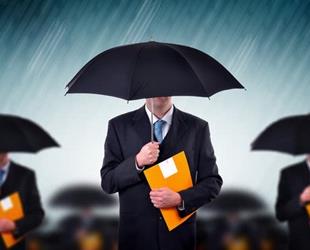Questions to ask your business insurance agent

Purchasing small business insurance is an investment in your company that protects your long-term financial health.
When you start to explore options, there are several important insurance questions to ask before purchasing one or more business policies to make sure you have the right coverage.
No business owner can foresee every issue that might impact operations, which is why it’s crucial to find the insurance policies that are best suited to your business. Here are some important questions to ask your business insurance agent or broker:
1. What types of business insurance policies do I need?
The types of business insurance policies you need are determined by your business's operations, its location, exposure to risk, and a variety of other factors.
General liability insurance
Most businesses need general liability insurance, one of the most common policies that business owners look for.
General liability insurance provides coverage for customer injuries, damage to customer property at your business, and advertising injury. It is often required for a business to sign a lease or client contract.
Learn more about how much general liability costs and other frequently asked questions.

General liability insurance is not usually required by law, but business owners should be aware of situations when a licensing body, a client, or a lessor might require this common type of coverage.
Depending on the nature of your business, you might also need:
Errors and omissions insurance
An errors and omissions insurance (E&O) policy, also called professional liability insurance, is designed to protect you and your employees from claims by clients or customers of inadequate work or negligence.
While this protection might not be required in your industry, it’s advisable for any business that provides services to a client.
Learn more about how much E&O insurance costs and other frequently asked questions.

Federal and state laws mandate errors and omissions insurance for certain professions. Small businesses may also need it to fulfill the requirements of a client contract or a licensing body.
Workers’ compensation insurance
Workers’ compensation insurance provides benefits to an employee who becomes injured or ill on the job. It also protects business owners from liability with employer's liability coverage.
Regardless of the level of risk associated with your business, workers’ comp insurance is required in most states for businesses with employees. Learn more about specific requirements in your state.
Learn more about how much workers' comp insurance costs and other frequently asked questions.
Commercial auto insurance
Commercial auto insurance covers legal bills, medical expenses, and property damage if a business vehicle is involved in an accident. It is required in most states for businesses that own vehicles, and all states require the ability to compensate someone if you or an employee are at fault in an accident.
If you or your employees use any personal, leased, or rented vehicles for work, you need hired and non-owned auto insurance (HNOA) because your personal or commercial auto insurance wouldn’t cover any accidents that happen during work-related activities.
Learn more about how much auto insurance costs and other frequently asked questions about commercial auto insurance and HNOA.
The types of business insurance policies you need are determined by your business's operations, its location, exposure to risk, and a variety of other factors.
Business owner’s policy
Business owner’s policy combines general liability and property insurance, often at a discounted rate. This policy is a good option if your business owns real estate or high-value business property, such as office supplies, furniture, and computers.
Learn more about how much a BOP policy costs and other frequently asked questions.
2. How do I submit a business insurance claim?
This is an important question to ask your business insurance agent. When an incident occurs, you will want to act fast. The agent who sells and manages your insurance policy is likely not the person to call when you think you have a claim. Rather, you would most likely contact the insurance company’s claims department as your first call.
The sooner you open a claim with your insurer, the faster it can be resolved, and the easier it will be for the insurance company to evaluate how much you are owed and how soon you will require payment.

3. How much will my business insurance policy cover?
When you compare business insurance quotes to determine which policy is the most cost-effective for your business, your policy could have two kinds of payment limits:
- Aggregate limit. This is the maximum that your policy will pay in a single year for all of your claims combined.
- Per-occurrence limit. This is the maximum that you would be able to receive for any single claim.
Your limits will be based on the size of your business, the relative risk within your specific industry, and your claims history. A licensed insurance agent can give you advice on which policy limits are best for your business.
4. What affects my business insurance costs?
There are several factors that could impact your small business insurance costs, including the policy types you are considering and your business operations. Here are some of the most common factors that could affect the price of your policies:
Type of business or industry
Different professions carry different levels of relative risk. If your business has a fleet of vehicles, for example, and employees who spend a lot of time on the road, your insurance needs will be different from a business that is only office-based.
Number of employees
The cost of your business insurance policies will depend on whether you are a sole proprietor or have employees. For workers’ compensation insurance, in particular, your rate is affected by payroll and number of employees. Businesses with more employees pay higher costs.
Previous claims
Insurance companies use certain metrics to determine a company’s level of risk, and an agent could ask for your insurance loss runs if you are applying for a new policy. If your company has made few insurance claims, you would likely be perceived as low-risk. But if you have had several claims, that might raise your premium costs. One way to keep your claims to a minimum is to make sure that employees are properly and continually trained on safety protocols specific to your workplace.
Risk
While the type of business you’re in is the biggest determinant of risk, there might be other factors besides the level of risk for your employees. If your company has a location that is frequented by the public, there might be risks associated with walkways, parking lots, or other issues with the physical premises that you wouldn’t have if your business doesn’t welcome the public.
Payment plan
You will likely pay your insurance premium in either a lump sum or monthly installments, depending on the carrier and your choices. You can also opt for a commercial umbrella insurance policy if you want to be insured for additional risk. An umbrella policy is a supplement that increases your coverage in $1 million increments.

5. How can I save money on insurance?
You can save money on small business insurance by bundling policies, but also by managing risks inherent in your business by creating a safe workplace environment.
It’s also important to compare policies from different carriers to find savings and the best coverage for your needs.
Compare quotes from trusted carriers with Insureon
Complete Insureon’s easy online application today to compare insurance quotes from top-rated U.S. carriers. Once you find the right policy for your small business, you can begin coverage in less than 24 hours.
